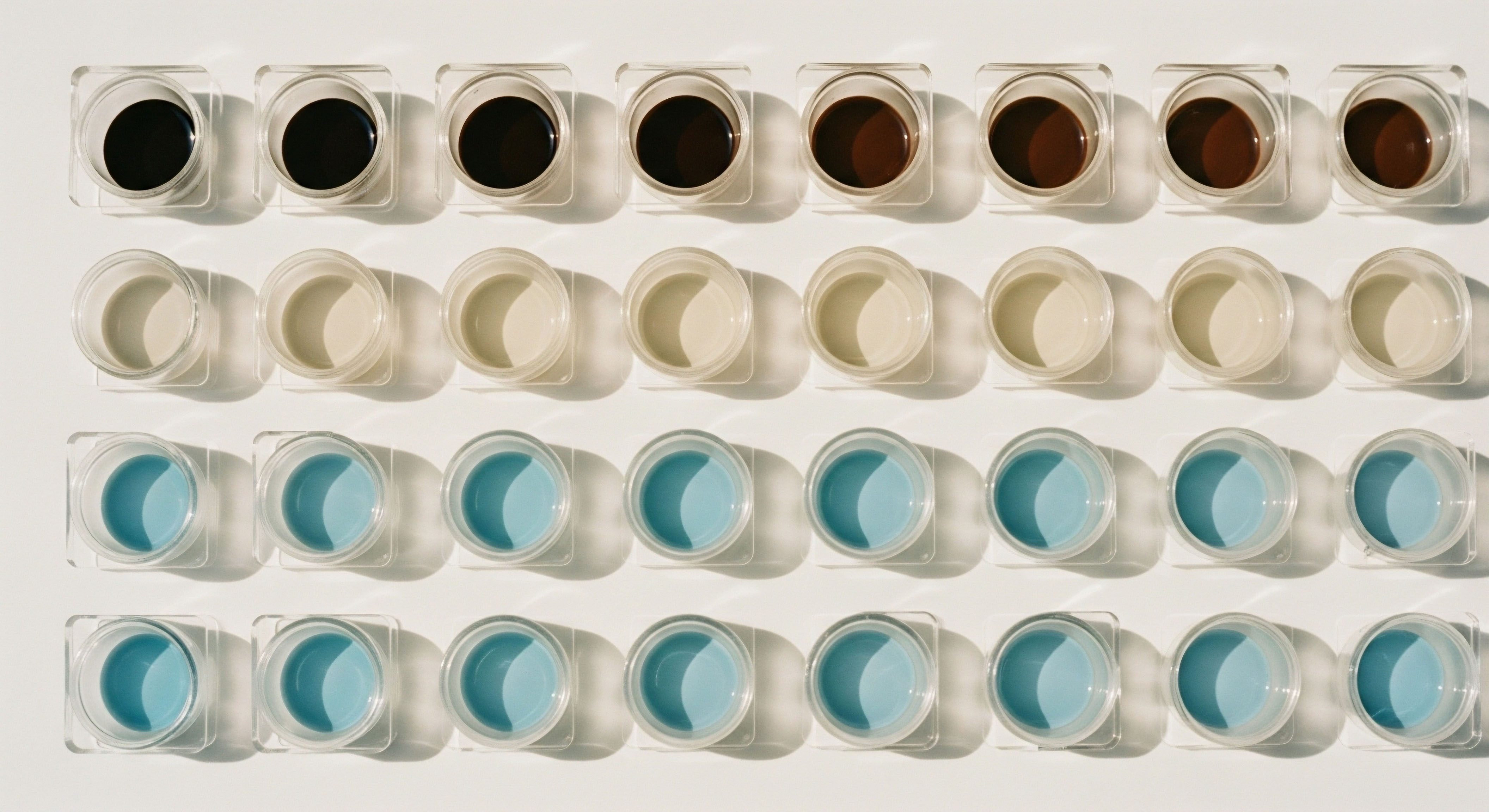

The Neurological Signature of Drive
Mental fortitude is a direct output of neurochemistry. The feelings of drive, motivation, and resilience are governed by the interplay of hormones and neurotransmitters within the brain’s complex circuitry. Testosterone is a primary signaling molecule in this system, acting directly on androgen receptors located throughout the brain.
Its presence influences the density and sensitivity of these receptors, effectively tuning the entire operating system for performance. This is the biological substrate of ambition; a chemical instruction set that dictates the intensity of our response to challenge and opportunity.
The relationship between testosterone and cognition is deeply rooted in neural architecture. Higher physiological levels of testosterone are associated with better preservation of brain tissue and improved performance on cognitive tests, particularly in domains like spatial reasoning and memory. The hormone exerts neuroprotective effects, shielding neurons from damage and supporting synaptic plasticity, the very basis of learning and adaptation.
It modulates cerebral blood flow and glucose metabolism, ensuring the brain has the requisite energy to execute demanding mental tasks. This creates an internal environment where focus is sustained, thoughts are clear, and the will to win is the default state.
A meta-analysis of seven prospective cohort studies has shown that low levels of plasma testosterone are significantly associated with a 48% increased risk of Alzheimer’s Disease in older men.

Dopamine and the Edge Effect
Testosterone’s most potent influence on mental state is its regulation of the dopaminergic system. Dopamine is the neurotransmitter of goal-oriented behavior, reward, and motivation. Testosterone upregulates dopamine receptor sensitivity, amplifying the feeling of satisfaction derived from achievement and reinforcing the behaviors required to attain it.
This creates a powerful positive feedback loop ∞ action leads to reward, which strengthens the motivation for further action. Men with optimal testosterone levels often experience a heightened sense of vigor and energy, which are positive aspects of aggression channeled into productive output. This is the edge; the intrinsic drive to compete, to build, and to master one’s environment.


Recalibrating the Command and Control System
Testosterone Replacement Therapy (TRT) is a clinical intervention designed to restore hormonal equilibrium. By re-establishing physiological testosterone levels, the therapy directly addresses the neurological deficits caused by androgen deficiency. The process is a systematic recalibration of the body’s command and control system, starting with the hypothalamic-pituitary-gonadal (HPG) axis and extending to every cell with an androgen receptor.
For the brain, this means restoring the signaling integrity required for peak cognitive and psychological function. It is a targeted upgrade to the core software that governs mood, focus, and mental resilience.
The administration of bioidentical testosterone provides the raw material to repopulate androgen receptors in the brain. This systematic restoration has cascading effects on multiple neurotransmitter systems. It helps normalize the production of cortisol, mitigating the chronic stress signals that can degrade cognitive performance. It enhances the efficiency of acetylcholine, a neurotransmitter vital for memory and learning.
The result is a stabilization of the entire neurochemical environment, leading to a more consistent and robust mental state. Several studies have demonstrated that TRT can lead to significant decreases in depression scores and improvements in global cognitive function in men with diagnosed testosterone deficiency.

Domains of Neurological Enhancement
The cognitive and psychological benefits of TRT manifest across several distinct domains. The process is methodical, with improvements appearing as the body acclimates to a restored hormonal baseline. The following represents a typical progression of neurological recalibration:
- Mood Stabilization: Early effects often include a reduction in irritability and an elevation of baseline mood. TRT has been shown to improve symptoms of depression and anxiety in hypogonadal men.
- Energy and Vigor: A renewed sense of physical and mental energy is a hallmark of successful therapy. This is tied to testosterone’s role in red blood cell production and cellular metabolism.
- Cognitive Clarity: Patients frequently report the lifting of “brain fog.” This corresponds to improvements in working memory and processing speed as neural inflammation decreases and metabolic efficiency increases.
- Enhanced Spatial Cognition: Testosterone plays a key role in the brain’s spatial processing networks. Optimized levels can improve spatial memory and reasoning abilities.
- Increased Motivation and Drive: The restoration of dopamine system sensitivity leads to a renewed ambition and a greater capacity for goal-directed action.


Decoding the Signals for System Optimization
The determination for intervention is a data-driven process. The primary indicators are a combination of subjective symptoms and objective biomarkers. Mental fortitude is compromised when the underlying biological systems are suboptimal. Symptoms such as persistent fatigue, reduced motivation, increased irritability, and a noticeable decline in memory or focus are critical signals. These subjective experiences, when correlated with serum testosterone levels below the optimal physiological range, indicate a clear rationale for considering system optimization through TRT.
The diagnostic process involves comprehensive blood analysis to measure total and free testosterone, along with other key markers like estradiol, LH, and SHBG. This provides a complete picture of the endocrine system’s status. A diagnosis of testosterone deficiency syndrome (TDS) is made when low levels are present alongside clinical symptoms.
It is a clinical condition that requires a clinical solution. The decision to initiate therapy is the first step in a precisely monitored journey toward restoring the neurochemical environment that underpins mental strength.

Timeline to Peak Performance
The neurological benefits of TRT unfold over a predictable, albeit individualized, timeline. The process is a gradual restoration of function as the brain’s chemical signaling pathways are brought back online. While some effects are felt relatively quickly, the full spectrum of cognitive and mood enhancement requires sustained physiological balance.
- First Month: Initial improvements are often in mood and energy. A reduction in anxiety and an increased sense of well-being are common. Libido and general vitality often see a marked increase.
- Three to Six Months: Cognitive benefits become more pronounced. Improvements in memory, focus, and mental clarity are typically reported during this period. Reductions in depressive symptoms become statistically significant.
- Six Months and Beyond: The full neuroprotective effects of testosterone are realized. Sustained optimization supports long-term brain health, synaptic plasticity, and the preservation of cognitive function against age-related decline.
In one clinical study, men with testosterone deficiency syndrome undergoing TRT for 8 months showed significantly increased total testosterone levels, a significant decrease in depression scores, and a significant increase in cognitive function scores.

Biology Is Your Biography
Your mental state is a direct reflection of your internal chemistry. The capacity for resilience, the drive to achieve, and the clarity of thought that define mental fortitude are not abstract virtues. They are the tangible outputs of an optimized endocrine system.
Viewing the brain as a high-performance machine, and hormones as the critical signaling molecules that regulate its function, provides a new framework for personal mastery. It moves the conversation from one of sheer willpower to one of precise biological engineering. The ultimate upgrade is internal. When the system is calibrated, the mind performs.



